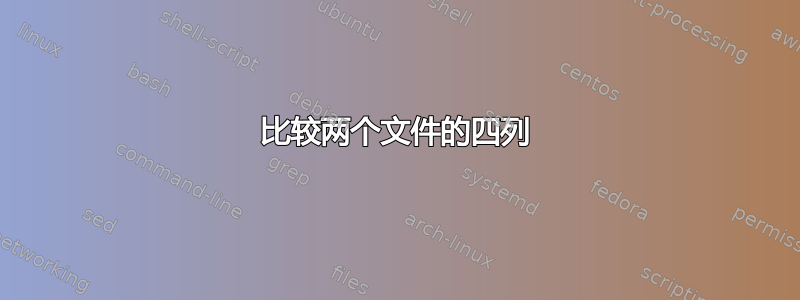
我有两个 csv 文件,其中包含一些日志信息。我需要将 field1 (file1) 与 field2 (file2) 的行进行比较,范围为 1 分钟 (-00:00:01 < time < 00:00:01) 以及 field5 (file1) 与 field3 (file2) 。如果它们匹配,则复制 field3 (input2) 到输出并打印 file1 中的下一个字段,否则写入“NOACT”。我尝试过awk,join但python没有成功。
文件1(55000000行):
19:15:30.047315,184.125.142.179,87492,174.145.246.178,87961,.,7648919765,145,767942442,896450764,1
19:15:30.047578,184.125.142.185,87492,174.145.246.132,52364,.,7648919765,145,767942442,896450764,1
19:15:31.047315,184.125.142.145,87492,174.145.246.158,52364,.,7648919765,145,767942442,896450764,1
19:15:31.049687,184.125.142.145,87492,174.145.246.158,44444,.,7648919765,145,767942442,896450764,1
19:15:32.049687,184.125.142.145,87492,174.145.246.158,44454,.,7648919765,145,767942442,896450764,1
文件2(25000行):
19:15:30,187.173.121.63,42347,NOT
19:15:30,187.173.121.63,52364,OK
19:15:30,187.173.121.63,52364,OK
19:15:32,145.246.158,44444,NOT
预期输出:
19:15:30.047315,184.125.142.179,87492,174.145.246.178,87961,.,7648919765,145,767942442,896450764,1,NOACT
19:15:30.047578,184.125.142.185,87492,174.145.246.132,52364,.,7648919765,145,767942442,896450764,1,OK
19:15:31.047315,184.125.142.145,87492,174.145.246.158,52364,.,7648919765,145,767942442,896450764,1,NOACT
19:15:31.049687,184.125.142.145,87492,174.145.246.158,44444,.,7648919765,145,767942442,896450764,1,NOT
19:15:32.049687,184.125.142.145,87492,174.145.246.158,44454,.,7648919765,145,767942442,896450764,1,NOACT
例子
文件1:
A11 A12 A13 A14 A15 A16 A17 A18 A19 A110
A21 A22 A23 A24 A25 A26 A27 A28 A29 A210
A31 A32 A33 A34 A35 A36 A37 A38 A39 A310
文件2:
B11 B12 B13
B21 B22 B23
B31 B32 B33
我需要查看 B11 是否与 A11 匹配,如果是,则查看 B12 是否与 A15 匹配。如果是,则写入输出的第一行 (outline1= inputAline1 && B13),否则转到 B 的下一行。如果未找到匹配项,则写入 A && "NOACT" 的第一行。
答案1
您可以用于sqlite加入您的数据:
$ sqlite3 <<EOT
.mode csv
CREATE TABLE file1 (A11,A12,A13,A14,A15,A16,A17,A18,A19,A110,A111);
CREATE TABLE file2 (B11,B12,B13,B14);
.import file1 file1
.import file2 file2
SELECT DISTINCT file1.*, ifnull(file2.B14,"NOACT") FROM file1 LEFT JOIN file2 ON abs(julianday(file1.A11) - julianday(file2.B11))*86400.0 < 1 AND A15 = B13;
EOT
这使:
19:15:30.047315,184.125.142.179,87492,174.145.246.178,87961,.,7648919765,145,767942442,896450764,1,NOACT
19:15:30.047578,184.125.142.185,87492,174.145.246.132,52364,.,7648919765,145,767942442,896450764,1,OK
19:15:31.047315,184.125.142.145,87492,174.145.246.158,52364,.,7648919765,145,767942442,896450764,1,NOACT
19:15:31.049687,184.125.142.145,87492,174.145.246.158,44444,.,7648919765,145,767942442,896450764,1,NOT
19:15:32.049687,184.125.142.145,87492,174.145.246.158,44454,.,7648919765,145,767942442,896450764,1,NOACT
答案2
以下脚本应该可以完成您在 python 中寻找的内容:
#!/usr/bin/env python3
import sys
import csv
import bisect
import re
timeRange = 1 # seconds
# Timestamps should match the following regex
timestampRegex = re.compile('[0-9]*:*[0-9]*:[0-9][0-9]\.*[0-9]*')
# Convert the time from a string 'hh:mm:ss' to a float
def timeToFloat(time):
# We add hours and minutes in case they are missinge
# We reverse the list
# We only take the first three elements of the list anyway
(s, m, h) = (['00', '00'] + time.split(':'))[::-1][0:3]
result = float(h) * 3600 + float(m) * 60 + float(s)
return result
if (len(sys.argv) != 4):
print('Usage: {} <input file 1> <input file 2> <output file>'.format(sys.argv[0]))
exit(1)
inputFileName1 = sys.argv[1]
inputFileName2 = sys.argv[2]
outputFileName = sys.argv[3]
# Each entry will be a tuple with the time as the first element
# and the row of file2 as the second element
file2Entries = []
with open(inputFileName2) as inputFile2:
csvReader = csv.reader(inputFile2)
for row in csvReader:
if len(row) == 4:
if not timestampRegex.match(row[0]):
continue
time = timeToFloat(row[0])
file2Entries.append((time, row))
file1Entries = []
with open(inputFileName1) as inputFile1, open(outputFileName, 'w') as outputFile:
csvReader = csv.reader(inputFile1)
# For each row in file1 we look for a match among the entries of file2
for row in csvReader:
if len(row) == 11:
if not timestampRegex.match(row[0]):
# We can't possibly find a match for this line
outputFile.write(','.join(row + ['NOACT']))
outputFile.write('\n')
continue
time = timeToFloat(row[0])
# Find the first and last entries of file2 within a range of 1 second
a = bisect.bisect_right(file2Entries, (time - timeRange,))
b = bisect.bisect_left(file2Entries, (time + timeRange,))
# Loop on the possible matches (those within the given range)
for entry in file2Entries[a:b]:
if entry[1][2] == row[4]:
outputFile.write(','.join(row + [entry[1][3]]))
outputFile.write('\n')
break;
else:
# We haven't found a match in file2
outputFile.write(','.join(row + ['NOACT']))
outputFile.write('\n')
您可以将其另存为compare.py并运行为:
./compare.py input1.txt input2.txt output.txt
请注意,我并不完全确定提取的范围的正确性,您应该确保它正常工作。
更新:第二个输入文件中不包含有效时间戳的行现在将被忽略,而第一个输入文件中不包含有效时间戳的行现在将复制到输出文件,并在末尾附加 NOACT
答案3
新编辑的脚本没问题,但在新行上停止,
这是错误
root@localhost:~/python# ./compare.py input1.txt input2.txt output.txt Traceback (most recent call last): File "./compare.py", line 46, in <module> for row in csvReader: File "/usr/lib/python3.2/codecs.py", line 300, in decode (result, consumed) = self._buffer_decode(data, self.errors, final) UnicodeDecodeError: 'utf-8' codec can't decode byte 0x83 in position 2099: invalid start byte``
我在 input1 中查找了下一行,它与其他行类似,所以我尝试解决该问题并发现了这一点:
我将脚本更改为
#!/usr/bin/env python3
import sys
import csv
import bisect
import re
timeRange = 1 # seconds
# Timestamps should match the following regex
timestampRegex = re.compile('[0-9]*:*[0-9]*:[0-9][0-9]\.*[0-9]*')
# Convert the time from a string 'hh:mm:ss' to a float
def timeToFloat(time):
# We add hours and minutes in case they are missinge
# We reverse the list
# We only take the first three elements of the list anyway
(s, m, h) = (['00', '00'] + time.split(':'))[::-1][0:3]
result = float(h) * 3600 + float(m) * 60 + float(s)
return result
if (len(sys.argv) != 4):
print('Usage: {} <input file 1> <input file 2> <output file>'.format(sys.argv[0]))
exit(1)
inputFileName1 = sys.argv[1]
inputFileName2 = sys.argv[2]
outputFileName = sys.argv[3]
# Each entry will be a tuple with the time as the first element
# and the row of file2 as the second element
file2Entries = []
with open(inputFileName2, encoding="utf8") as inputFile2:
csvReader = csv.reader(inputFile2)
for row in csvReader:
if len(row) == 4:
if not timestampRegex.match(row[0]):
continue
time = timeToFloat(row[0])
file2Entries.append((time, row))
file1Entries = []
with open(inputFileName1, encoding="utf8") as inputFile1, open(outputFileName, 'w', encoding="utf8") as outputFile:
csvReader = csv.reader(inputFile1)
# For each row in file1 we look for a match among the entries of file2
for row in csvReader:
if len(row) == 11:
if not timestampRegex.match(row[0]):
# We can't possibly find a match for this line
outputFile.write(','.join(row + ['NOACT']))
outputFile.write('\n')
continue
time = timeToFloat(row[0])
# Find the first and last entries of file2 within a range of 1 second
a = bisect.bisect_right(file2Entries, (time - timeRange,))
b = bisect.bisect_left(file2Entries, (time + timeRange,))
# Loop on the possible matches (those within the given range)
for entry in file2Entries[a:b]:
if entry[1][2] == row[4]:
outputFile.write(','.join(row + [entry[1][3]]))
outputFile.write('\n')
break;
else:
# We haven't found a match in file2
outputFile.write(','.join(row + ['NOACT']))
outputFile.write('\n')
但仍然出现一些错误


